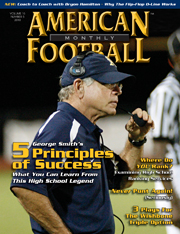AMERICAN FOOTBALL MONTHLY THE #1 RESOURCE FOR FOOTBALL COACHES
Article CategoriesAFM Magazine
|
Legendary Leader - George Smith of St. Thomas Aquinasby: Steve Dorsey© More from this issue George Smith of St. Thomas Aquinas shares principles that have helped him become one of the nation’s winningest coaches His heroes are old-school coaches like Paul “Bear” Bryant, Woody Hayes and Don Shula, and his disciplinarian style in many ways reflects an old-school coaching philosophy. But George Smith is not afraid to try something new if it will help give his football team an edge.
|
|
|||||||
| HOME |
MAGAZINE |
SUBSCRIBE | ONLINE COLUMNISTS | COACHING VIDEOS |
Copyright 2026, AmericanFootballMonthly.com
All Rights Reserved





